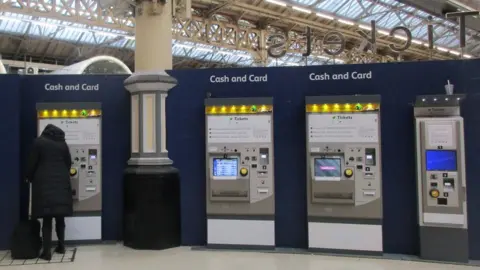Train ticket machines charging double online price
 Getty Images
Getty ImagesTicket machines at railway stations charge passengers more than double what they would cost online for some journeys, according to analysis.
Consumer group Which?'s research said same-day rail tickets were 50% more expensive on average at stations.
The best value fares were either unavailable or hidden among several options on many machines.
Plans to close hundreds of rail ticket offices in England were scrapped in November after a public outcry.
Prime Minister Rishi Sunak had said closing ticket offices was "the right thing for the British public and British taxpayers", before the government decided to ask train operators to withdraw the idea because it failed to meet high passenger standards.
Currently, just one in six of the 1,766 train stations controlled by the government has a full time ticket office, according to industry figures.

Have you been charged double at a train ticket machine?
- Email: [email protected]
- WhatsApp: +44 7756 165803
- Post on X: @BBC_HaveYourSay
- Please read our terms & conditions and privacy policy

'Simply astounding'
Which? sent mystery shoppers to 15 stations - each run by a different train operator - and checked the price of 75 journeys from a ticket machine against online retailer Trainline.
A journey from Holmes Chapel in Cheshire to London was found to cost £66 at a machine, whereas Trainline offered the same trip for £26.
Northampton to Cardiff was found to cost £107 from a machine, but just £43 online.
These tickets were not a direct comparison, but options for buying a ticket around the same time of day.
Rory Boland, editor of magazine Which? Travel, called the price differences "simply astounding".
There are several factors as to why tickets may be more expensive at machines. Some may not offer cheaper advance fares or split-ticketing, or make off-peak fares less visible.
"Huge numbers of us are potentially paying significantly more than we need to when we commute to work or visit friends and family across the country," Mr Boland said.
"Significant numbers of elderly people don't have internet access at all - leaving them with little choice but to run the gauntlet of ticket machines which either don't offer the best prices, or make it difficult to find the appropriate fares," he added.
Two in five stations do not have a ticket office at all, so if people don't have access to tickets online their only option is a railway station machine.
The sheer number of different train fares available can make it difficult for travellers to decide which is best for them.
LNER, which operates trains along the East Coast mainline, has been trialling ways to simplify fares. It has scrapped return tickets and this week said it would cut the number of available standard class fares from seven to three.
A spokesperson for the Rail Delivery Group, which represents train companies, said more progress was needed since the case for fares reform was raised in 2019.
"The introduction of single leg pricing and expansion of pay as you go contactless fares are both important changes making fares easier and simpler for customers.
"We will continue to work with government to achieve further reforms and deliver more benefits for our customers."
In December, the Department for Transport announced regulated train fares in England would rise by up to 4.9% from March - an increase capped below inflation and delayed from January when hikes usually come into force.
Regulated fares cover about 45% of fares, including season tickets on most commuter journeys, some off-peak return tickets on long-distance journeys and anytime tickets around major cities.
